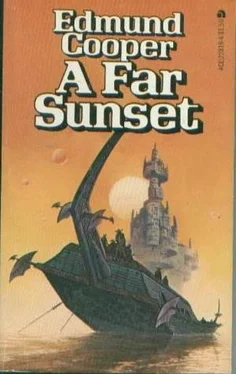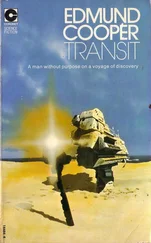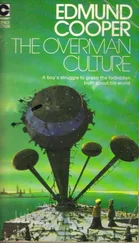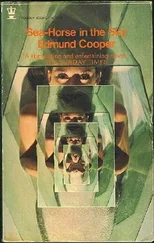The noia let out a deep breath. ‘It is a sweet and sad story,’ she said simply. ‘And I am glad, my lord, that you came. I am glad that I have known you.’
Outside there were sounds of marching feet. Presently the bars were taken from the door. Two slaves, watched by two guards, entered the donjon with platters of food and pitchers of water.
But Poul Mer Lo was not hungry.
The Gloria Mundi had gone into the thousand-kilometre orbit round Altair Five. Farther out in solar space other satellites were detected; but they had been rotating round the planet somewhat longer than the terrestrial vessel and they were untenanted. They were nothing more than great dead lumps of rock—the nine moons of Altair Five that had once, perhaps, been a single moon. To the naked eye they were large enough to reveal themselves as a flock of large and apparently mobile stars.
The planet itself was a miracle. Statistically it was the jackpot, for the occupants of the Gloria Mundi could not bring themselves to believe that—in a cosmos so empty,-yet whose material content was so diverse—either of the other terrestrial vessels could have encountered an earth-type planet. The odds were greater, as the Swedish physicist succincdy put it, than the chance of dealing four consecutive suits from a shuffled pack of playing cards.
Altair Five was not only earth-type; it was oddly symmetrical and—to people who had conditioned themselves to expect nothing but barren worlds or, at best, planets inhabited by life forms that were low in the biological series—quite beautiful. It was slightly smaller than Mars and nine-tenths of it was ocean, spotted here and there by a few small colonies of islands. But there was quite a large north polar continent and an almost identical south polar continent. But, most interesting of all, there was a broad horseshoe of a continent stretching round the equatorial region, one end of it separated from the other by a few hundred kilometres of water.
The polar continents were covered for die most part by eternal snows and ice; but the great mass of equatorial land displayed nearly all the features that might be observed on the terrestrial continent of Africa from a similar altitude.
There were mountains and deserts, great lakes, bush and tropical rain forests. Under the heat of the sun, the deserts burned with fiery, iridescent hues of yellow and orange and red; the mountains were brown, freckled with blue and white; the bush was a scorched amber; and the rain forests seemed to glow with a subtle pot-pourri of greens and turquoises.
The planet rotated on its own axis once every twenty-eight hours and seventeen minutes terrestrial time. Calculations showed that it would complete one orbit round Altair, its sun, in four hundred and two local days.
The life of the planet was clearly based upon the carbon cycle; and an analysis of its atmosphere showed only that there was a slightly higher proportion of nitrogen than in that of Sol Three.
The Gloria Mundi stayed in the thousand-kilometre orbit for four hundred and ten revolutions or approximately twenty terrestrial days. During that time every aspect of the planet was photographed and telephotographed. In one section of the equatorial continent, the photographs revealed the classic sign of occupation by intelligent beings—irrigation or, just possibly, transport canals.
The occupants of the Gloria Mundi experienced sensations akin to ecstasy. They had endured confinement, synthetic hibernation and the black star-pricked monotony of a deep space voyage; they had crossed sixteen light-years in sixteen years of suspended animation and over four years of waking and ageing. And at the end of it their privation and endurance had been rewarded by the best of all possible finds—a world in which people lived. Whether they were people with four eyes and six legs did not matter. What mattered was that they were intelligent and creative. With beings of such calibre it would surely be possible to establish fruitful communication.
The Gloria Mundi touched down within twenty kilometres of the nearest canals. With such a large ship—and bearing in mind that the German pilot had only experienced planetary manoeuvres of the vessel in simulation—it was a feat of considerable skill. The vessel burned a ten-kilometre swathe through the luxuriant forest then sat neatly on its tail while the four stability shoes groped gently through the smouldering earth for bedrock. They found it less than five metres down.
For the first three planetary days, nobody went outside the vessel. Vicinity tests were conducted. At the end of three days the airlock was opened and two armoured volunteers descended by nylon ladder into a forest that was already beginning to cover the scars of its great burning. The volunteers stayed outside for three hours, collecting samples but never straying more than a few metres from the base of the ship. One of them shot and killed a large snake that seemed to exhibit the characteristics of a terrestrial boa.
On the ninth day of planetfall an exploration team consisting of the Swedish pair, the French pair and the Dutch pair set out. Each of the members of the team wore thigh-length boots, plastic body armour and a light plastic visor. The temperature was far too high for them to wear more—other than fully armoured and insulated and altogether restricting space suits.
The women carried automatic sweeper rifles: the men carried nitro-pistols and atomic grenade throwers. All of them carried transceivers. Between them they had enough fire-power to dispose of a twentieth-century armoured corps.
Their instructions were to complete a semicircular traverse in the planetary east at a radius of five kilometres, to maintain radio contact every fifteen terrestrial minutes and to return within three planetary days.
All went well for the first planetary day and night. They encountered and reported many interesting animals and birds, but no sign of intelligent beings. In the middle of the second planetary day, radio communication ceased. At the end of the third day, the team did not return.
Six people, tormented by anxiety, were left aboard the Gloria Mundi. At the end of the fifteenth day of planetfall, a rescue team consisting of the three remaining women set out. They, too, carried nitro-pistols and grenade throwers.
The fact that it was the women who went and not the men was not fortuitous. Of the men who remained, two were vital to the running of the ship (assuming no success in rescue) if it was ever to return to Earth; and the third, Paul Marlowe, was suffering from a form of acute dysentry.
He said goodbye to Dr. Ann Victoria Marlowe, nee Watkins, without emotion. He was too ill to care: she was too clinical to be involved. After she had gone, he lay back on his bed, tried to forget his own exhausting symptoms and the world of Altair Five and to lose himself in a micro-film of one of the novels of Charles Dickens.
The rescue team maintained radio contact for no more than seven hours. Then it, too, became silent.
After four days, Paul Marlowe was over the worst of his dysentry; and he and his two companions were in a state of extreme depression.
They considered waiting in the citadel of the Gloria Mundi indefinitely; they considered pulling back into orbit; they even considered heading out of the system and back to Sol Three. For clearly there was something badly wrong on Altair Five.
In the end they did none of those things. In the end they decided to become a death-or-glory squad.
It was Paul Marlowe, the psychiatrist, who worked the problem out logically. Three people were necessary to manage the ship. Therefore there was no point in sending one or two men out if he or they failed to return. For the vessel would still be grounded. So they must either all go or all stay. If they stayed in the Gloria Mundi and eventually returned to Sol Three, they would lose their self-respect—in much the same manner as mountaineers who have been forced to cut the rope. If, on the other hand, they formed themselves into a second search party and failed, they would have betrayed the trust vested in diem by all the people of the United States of Europe.
Читать дальше












